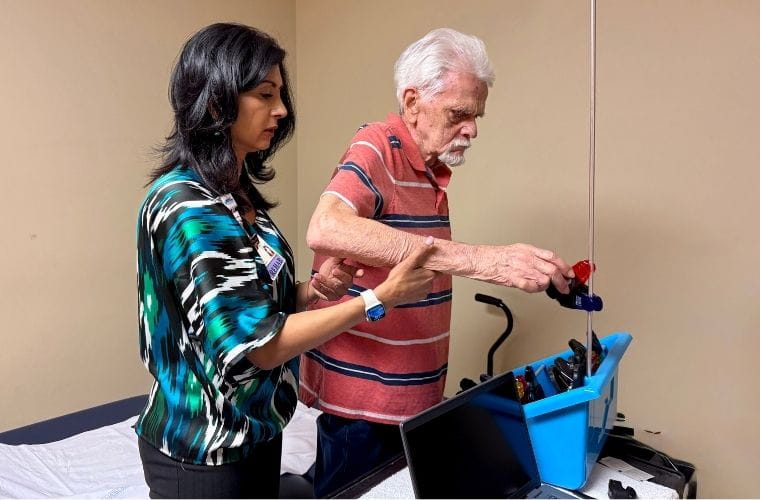BayCare Pairs Technology and Therapy to Restore Stroke Patients' Lives

BayCare Medical Group Neurosurgeon Benjamin Fox, MD, and physical and occupational therapists at BayCare’s Morton Plant Hospital are teaming up to help stroke patients regain physical abilities that seemed lost forever.
This innovative, evidence-based treatment reflects BayCare’s commitment to delivering clinical excellence to patients across West Central Florida.
Patients like Ted Marti, who experienced significant deficits after having a stroke in 2023, are experiencing remarkable results through a treatment that combines Vivistim, a vagus nerve stimulation (VNS) device with intensive rehabilitation therapy. The two-fold process helps rewire the brain’s connections, transforming the future of stroke recovery.
When Marti suffered a stroke, his wife, Debbie, immediately called 911, and paramedics took him to Morton Plant Hospital in Clearwater, a certified Comprehensive Stroke Center.
Surgical intervention was provided immediately, but Marti still faced a tough recovery ahead. For a year and a half, he worked to regain movement and abilities that seemed lost. Then in January, Dr. Fox contacted the family about the innovative treatment.
Candidates for Vivistim must have moderate to severe upper extremity impairment from an ischemic stroke and commit to six weeks of intense therapy – 90-minute sessions, three times a week.
Marti met those criteria and agreed to the treatment. He had improved after he first came home from the hospital in August 2023, but he and his wife knew he could be better.
This same technology has been used for years to help control seizures, which requires continuous activation. For stroke patients, the device is activated only when the patient is in therapy or practicing tasks.
Archana Arora and Austin Armstrong, Marti’s physical therapists, have seen encouraging progress as he continues therapy beyond the prescribed six weeks.
“Vivistim is approved to help patients gain more function in their upper extremities, but I have seen great improvement in Ted’s lower extremities as well,” Arora said. “When we started, he required a walker. Now he walks with a cane, and at home, he walks without any assistance.”
The key is the pairing of specific exercises with the implant. “The electrical impulses sent while doing a task builds neuroplasticity in the brain, which is what allows all of us to do everyday tasks without thinking,” Arora explained.
“The research showed that patients who paired the device with specific therapy had two to three times more hand and arm function than those who only did therapy,” Dr. Fox shared.
For physicians and therapists, success means helping patients achieve the highest possible quality of life, with goals tailored to what matters most to them and their families. “It is so rewarding to see a glimmer of hope in the eyes of the patient and family before the implant and then witness the patient regaining ability to do things they love or just be more independent,” Dr. Fox said.
For the Martis, who have been married for 55 years, that means traveling. They enjoyed a transatlantic cruise in March and have another one scheduled in a few months, which was something Debbie Marti couldn’t even imagine in 2023.
Learn more: Stroke Clinic at Morton Plant Hospital
